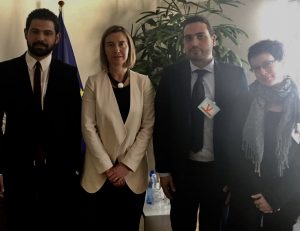Federica Mogherini, the EU High Representative for Foreign Affairs and Security Policy, met with a delegation from the Cairo Institute for Human Rights Studies (CIHRS) at the EU headquarters in Brussels on 13th of March 2017 to discuss the deteriorating human rights situation in Libya. The delegation was led by Karim Salem, CIHRS Libya Researcher and Leslie Piquemal, CIHRS EU representative in Brussels. The delegation included independent political activist Hisham al-Windi and Zahra Lanqi, a rights activist and the head of the Libyan Women for Peace Platform representing the Coalition of Libyan Civil Society Organizations Working in Human Rights (Manassa).
The meeting addressed the fragmentation of the security establishment, and the growth of extremist groups within military and paramilitary groups in western and eastern Libya. The agenda of discussion revolved around the political deadlock, the growing crackdown on journalists and media personnel, human rights defenders, judicial personnel and the continued exclusion of civil society activity from the public sphere. Furthermore the discussion addressed ways by which the EU could support state institutions, peaceful democratic political sphere and respect for human rights; as well as promoting dialogue and action to end interference fueling the violence in Libya.
HR/VP Mogherini affirmed the EU’s commitment to continued, full support for a comprehensive resolution of the Libyan crisis; including support for political dialogue, the constitutional committee and state institutions. HR/VP Mogherini affirmed that building the rule of law and respect of human rights is an EU priority in Libya.
Karim Salem explained that one of the prime causes of the deteriorating humanitarian and rights situation in Libya is the lack of international instruments for accountability and the investigation of rights violations, particularly in light of the weakness of national accountability mechanisms in Libya. This undermines the process toward political consensus, enlarges fragmentation of the security apparatus and the emergence of extremist militias in Libya on various sides of the conflict. Salem added that a strong message must be sent to perpetrators of human rights violations and those obstructing the political process.
To this end, the EU should support the establishment of an international investigation mechanism to be adopted by the UN Human Rights Council in the March 2017 session, in order to assist in determining individual criminal liability for violations as well as the responsibility of states that violate the UN Security Council (UNSC)’s arms embargo in Libya. These practices only stoke violence in Libya and do notsupport the fight against terrorism. Moreover, Salem said, militias receiving aid in violation of UNSC resolutions impede peaceful democratic progress, commit gross violations, and include within them extremist groups other than the Islamic State. Salem urged the EU efforts to activate international judicial jurisdiction through the national judiciaries of EU member states and support the power of the International Criminal Court to hear cases involving violations in Libya, before and after 2011.
Hisham al-Windi reviewed the extensive efforts made by Libyans to combat the Islamic State in Benghazi and Sirte, urging support for the peaceful political process and dialogue in Libya, to reach a genuine political and societal consensus. He stressed the need for a firm stand up to all states that support Libyan militias. Seeking to impose political and military agendas that are detrimental to the Libyan people, leaving Libyans with no other option but to consent.
Zahra Langhi criticized the foreign policy of certain EU member states in handling the migration crisis. Particularly the latest Italian-Libyan Memorandum of Understanding which would only exacerbate the fragility of the Libyan Presidency Council and increases the violations of human rights of migrants. Langhi emphasized that no resolution to the Libyan crisis can be achieved except through a holistic, coherent, integrated approach. Langhi called for looking beyond the short-term “political resolution” of the fragile Libyan Political Accord which expires in 9 months.
Langhi proposed the EU develops a long-term strategy ending the transitional period through focusing on building consensus on the question of Constitution. Langhi stressed the need of a bottom-up approach in developing strategies that fosters the resilience of local communities. It is pivotal to address the rootcause of the crisis, namely, unchecked militarization and proliferation of arms and militias, within an atmosphere of total impunity. Langhi added that Libyan civil society is facing a widespread crackdown, including threats, kidnappings, defamation and travel bans; and called for the repel of the statuessued in 2016 that impedes the work of local and international organizations. Requesting amended statues that guarantees the freedoms of association and expression.
Share this Post


